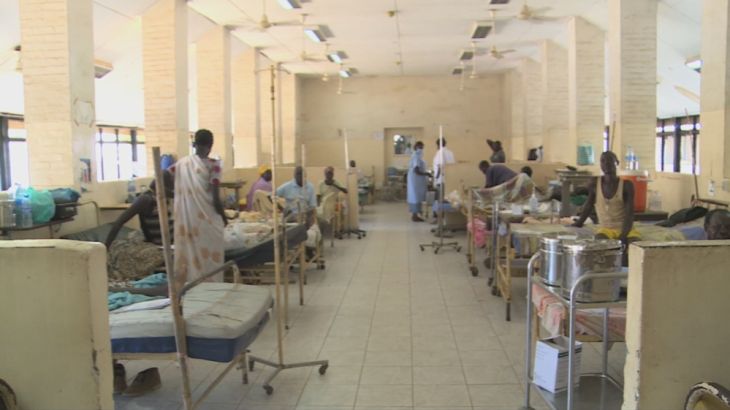South Sudan: After war, fears of a health emergency
Aid agencies warn of an impending medical crisis in the world’s youngest nation as donor countries cut back on aid cash.

As South Sudan emerges from two years of war, with a fragile peace in place, aid agencies have warned that it may now face a medical crisis.
Civil war erupted in 2013 when President Salva Kiir sacked his deputy Riek Machar barely two years after the country seceded from Sudan. Nearly two years of ruinous war that followed killed thousands and displaced millions, with UN agencies warning of mass hunger in the world’s youngest nation.
Keep reading
list of 4 itemsWoman, seeking loan, wheels corpse into Brazilian bank
UK set to ban tobacco sales for a ‘smoke-free’ generation. Will it work?
Poland lawmakers take steps towards liberalising abortion laws
The government spends just 2 to 3 percent of its gross domestic product (GDP) on healthcare.
Previously, international donors have invested huge sums. But now they say they will cut the amount of medicine they are providing and want South Sudan to spend more.
READ MORE: South Sudan marks two years of ruinous war
Some believe they are using healthcare funding as a political tool to force the government to increase its spending. But critics say if that is the case, then the victims will be some of the poorest people in the world.
At a clinic that was treating her daughter for swelling in the abdomen, Rose John Modi told Al Jazeera that doctors had the means neither to diagnose her child’s condition, nor to treat it.
“They said the medicines for her illness aren’t here, that’s what the doctor said, he said there are no medicines,” she said. “She’s the apple of my eye.”
The clinic had no painkillers to ease her suffering and her parents were told their only option was to take her out of the country for treatment, something they could not afford.
Her daughter, Angelina, who was 10, died two days later.
|
|
| Inside Story: South Sudan’s forgotten crisis |
“There’s always been a shortage of medical supplies in South Sudan and doctors in the public hospitals are used to working with very little,” Al Jazeera’s Anna Cavel, reporting from Juba, said.
“But a further reduction in supply will only mean one thing, and that’s even more unnecessary deaths and suffering.”
The country’s Chief Medical Officer said he hoped the government would step in and allocate more money for healthcare.
“If there are two or three priorities that the government should take up and do something about, then health should be one of those,” Dr Makur Koriom told Al Jazeera.
“I can be confident that the politicians and the leadership of the country understands this very well: that they have got a responsibility towards the citizens of this country and that they have to do it.”
READ MORE: US warns it could slap sanctions on South Sudan leaders
Rebel leader Machar was sworn in as vice president last week after he returned to Juba from his base in neighbouring Ethiopia.
The United States, which was a key backer of South Sudan statehood, said Machar’s return was an important step towards the establishment of a unity government. Kiir and Machar signed a peace deal last August brokered by the US and regional countries.
On Thursday, US officials said they would consider imposing sanctions or an arms embargo on the countries if they failed to cooperate in a proposed unity government to end the bloody conflict.
“We have everything at the table: we are prepared to look at sanctions, we are prepared to look at an arms embargo,” said Donald Booth, US special envoy to Sudan and South Sudan.